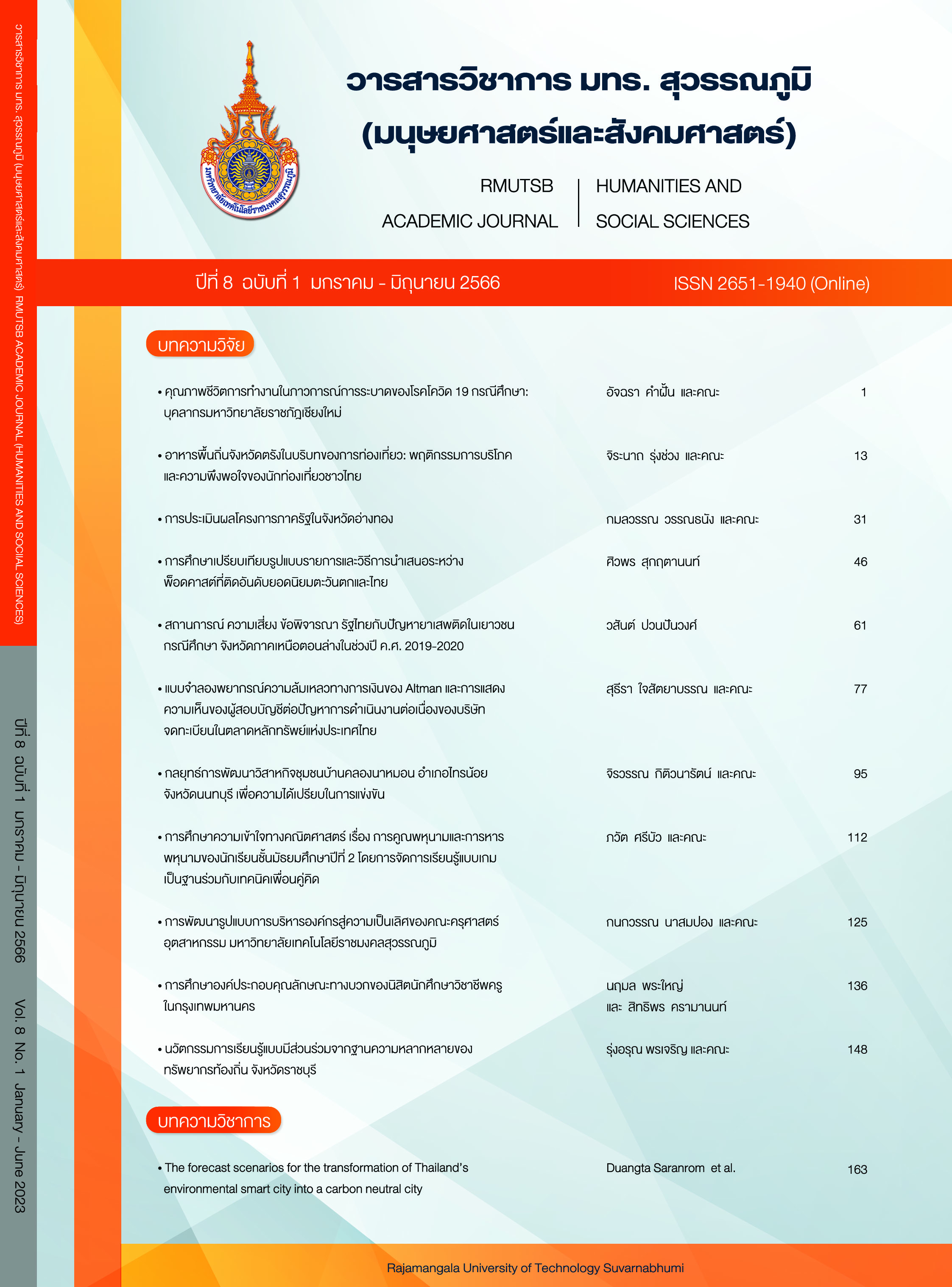Altman’s financial distress model and auditor’s opinion on the going concern problem of listed companies on the Stock Exchange of Thailand
Main Article Content
Abstract
This research objective is to study the relationship between the financial status according to Altman’s financial distress model and auditor’s opinion on the going concern problem of listed companies on the Stock Exchange of Thailand. The data are collected from financial statements and auditors’ reports in 2020 which can be retrieved from The Securities Exchange Commission’s website. This study utilizes the purposive sampling and matched pair sample design. Specifically, the companies receiving auditor’s opinion on the going concern problems are matched with those having similar characteristics but receiving other types of auditor’s opinion. The number of samples is 44 firms in total. The main statistical analysis is Logistic Regression. The main result indicates that if the companies have high financial pressure or have high risk to go bankrupt (distress zone or low Z-Score), they will have potential to receive auditor’s opinion on the going concern problems. The financial distress under the Altman’s model is negatively related to the auditor’s report with the going concern’s problems. Moreover, the reliability of Altman’s model in this research represents the accuracy of forecasting at 90.90% which can be implied that the Altman’s model can be well used for forecasting the auditor’s opinion in Thailand.
Article Details

This work is licensed under a Creative Commons Attribution-NonCommercial-NoDerivatives 4.0 International License.
References
Altman, E. I. (1968). Financial ratios, discriminant analysis and the prediction of corporate bankruptcy. The Journal of Finance, 23(4), 589-609.
Altman, E. I., Hartzell, J., & Peck, M. (1998). Emerging market corporate bonds — a scoring system. In R. M. Levich (Eds.), Emerging market capital flows (pp. 391-400). Boston: Springer.
Blay, A. D., Geiger, M. A., & North, D. S. (2011). The auditor's going-concern opinion as a communication of risk. Auditing A Journal of Practice & Theory, 30(2), 77-102.
Chen, K. C. W., & Church, B. K. (1996). Going concern opinions and the market’s reaction to bankruptcy filings. The Accounting Review, 71(1), 117-128.
Federation of Accounting Professions (TFAC). (2016). Thai standard on auditing (TSA) 570 (Revised), Going Concern. Retrieved 23 April 2021, from https://acpro-std.tfac.or.th/uploads/files/TSA/2559_TSA570(Revised).pdf (in Thai)
Francis, J. R., & Yu, M. D. (2009). Big 4 office size and audit quality. The Accounting Review, 84(5), 1521-1552.
Geiger, M. A., & Rama, D. V. (2006). Audit firm size and going-concern reporting accuracy. Accounting Horizons, 20(1), 1-17.
Hair, J. F., Black, W. C., Babin, B. J., & Anderson, R. E. (2010). Multivariate data analysis (7th ed.). New Jersey: Pearson Prentice Hall.
Jackson, A. B., Moldrich, M., & Roebuck, P. (2008). Mandatory audit firm rotation and audit quality. Managerial Auditing Journal, 23(5), 420-437.
Jieranai, S. (2014). Relationship between audit attributes and going concern opinion on listed companies in the Stock Exchange of Thailand (Master’s thesis). Kasetsart University, Bangkok. (in Thai)
Junaidi, J., Triyatmi, C. S., & Nurdiono, N. (2012). Financial and non financial factors on going-concern opinion. Journal The Winners, 13(2), 135-146.
Knechel, W. R., & Vanstraelen, A. (2007). The relationship between auditor tenure and audit quality implied by going concern opinions. A Journal of Practice & Theory, 26(1), 113-131.
Maedee, M. (2006). The relationship among auditor tenure, audit firm size, auditor change and going concern audit reports on listed companies in the Stock Exchange of Thailand (Master’s thesis). Chulalongkorn University, Bangkok. (in Thai)
Myers, L. A., Schmidt, J. J., & Wilkins, M. S. (2013). An investigation of recent changes in going concern reporting decisions among big N and non-big N auditors. Review of Quantitative Finance and Accounting, 43, 155-172.
Prayanthi, I., & Kakunsi, N. G. C. (2017). The Altman model and auditor’s opinion about going concern of the companies. Science Journal of Business and Management, 5(5), 189-193.
Ryu, T. G., & Roh, C. Y. (2007). The auditor's going-concern opinion decision. International Journal of Business and Economics, 6(2), 89-101.


